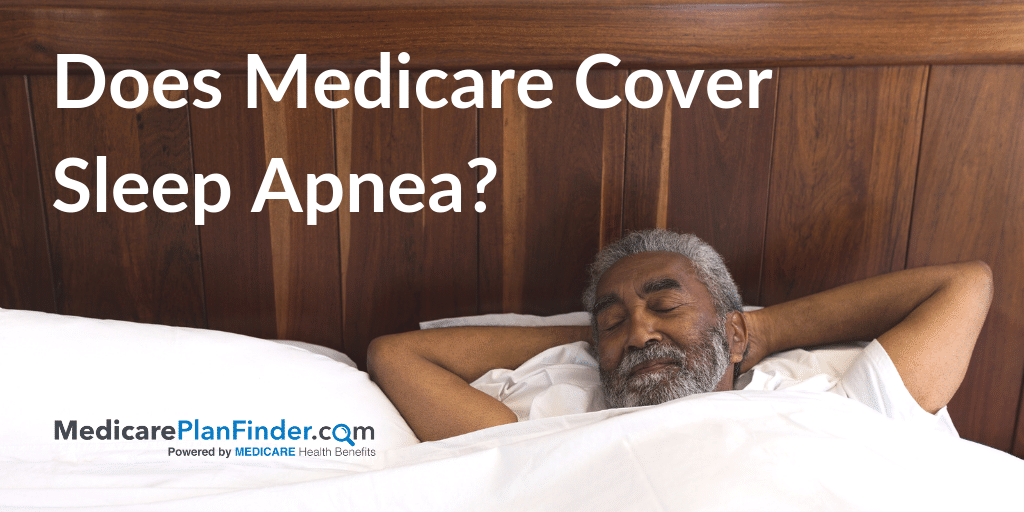
Does Medicare Cover Sleep Apnea?
May 22, 2019Sleep apnea is a condition in which a person repeatedly stops breathing while they sleep for about 10 seconds. Its effect on sleep quality is astronomical.
Sleep apnea is one of the leading causes of insomnia in adults over age 40. If you’re eligible for Medicare and have trouble sleeping, you may want to know, “Does Medicare cover sleep apnea?”
Medicare coverage for sleep apnea starts with Part B, and it includes some of the costs related to sleep apnea, such as doctor’s visits to diagnose and treat the condition.
Does Medicare Cover CPAP Machines?

Medicare Part B will cover a CPAP machine to help treat your sleep apnea if your doctor determines that it is medically necessary. A CPAP machine stops the airways from collapsing by sending pressurized air into the throat, allowing the user to sleep.
Medicare coverage for CPAP machines comes with a three-month trial period. You may be responsible for paying 20 percent of your CPAP rental with Medicare costs, and 20 percent of the masks and tubing costs.
If your doctor determines that the CPAP machine helps your sleeping disorder, Medicare will continue to cover your CPAP machine. Medicare will continue to pay for your CPAP rental for 13 months.
You own the machine after the rental period. If you already owned a CPAP machine before you enrolled in Medicare, you might be able to receive coverage for renting a replacement machine or accessories.
How to Get a CPAP Machine
The Centers for Medicare and Medicaid (CMS) consider CPAP machines to be durable medical equipment (DME). Medicare.gov has a resource for finding DME in your area.
If you have a prescription for a CPAP machine, click here. Enter your zip code to find your nearest Medicare-approved DME provider. For demonstration purposes, we chose 37209, which is the zip code for our corporate offices in Nashville, TN.
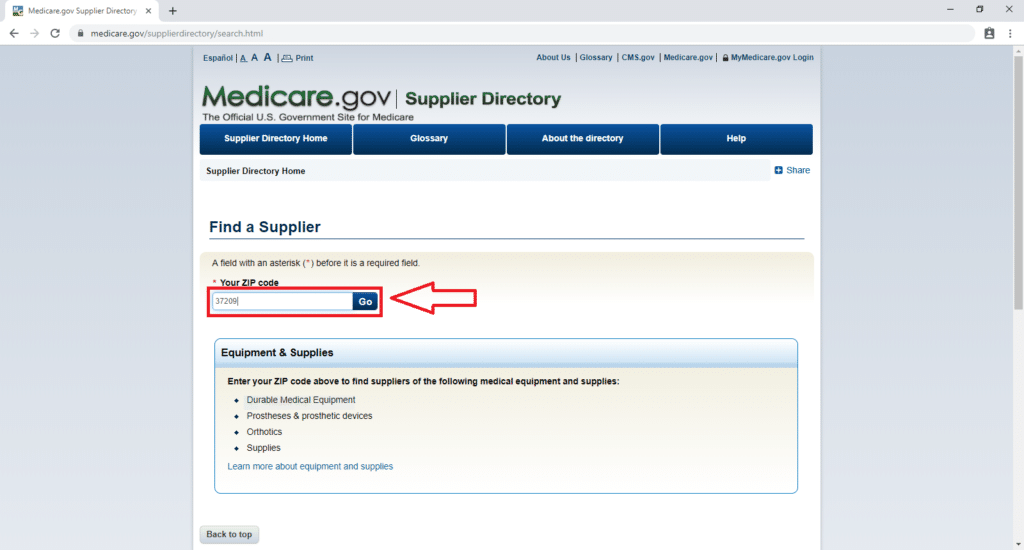
You will then reach a page that lists providers for many types of DME. Since we’re only going to cover CPAP machines, click the box marked “CPAP, RADs, & Related Supplies & Accessories” as shown below in red. Then click “Search” as shown below in blue.
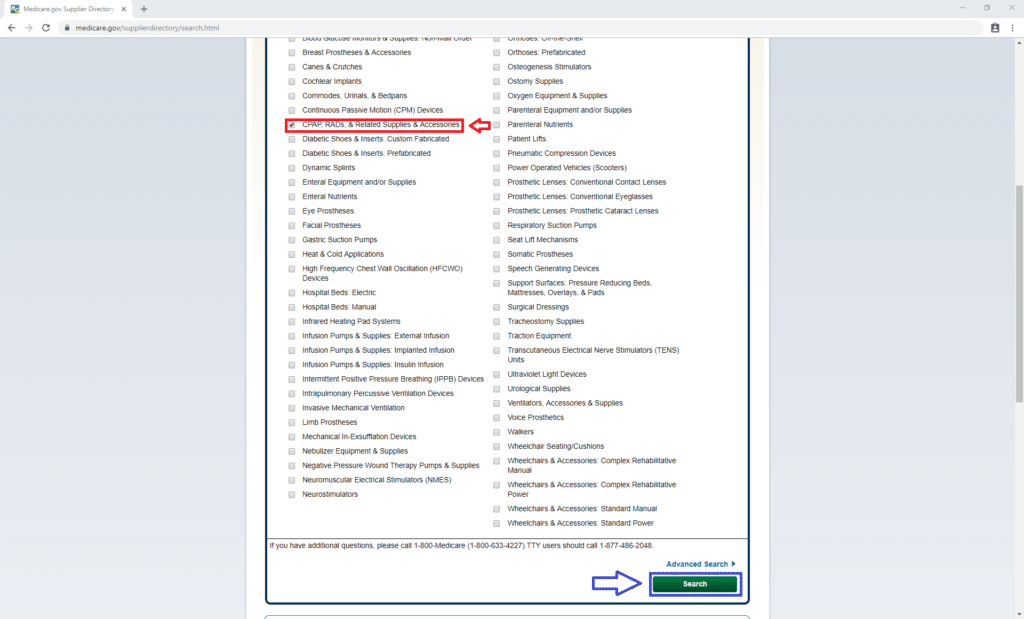
Once you do that, you will come to a page that tells you how many CPAP machine providers are in your area that looks like this. Click on the box that tells you how many local results there are.
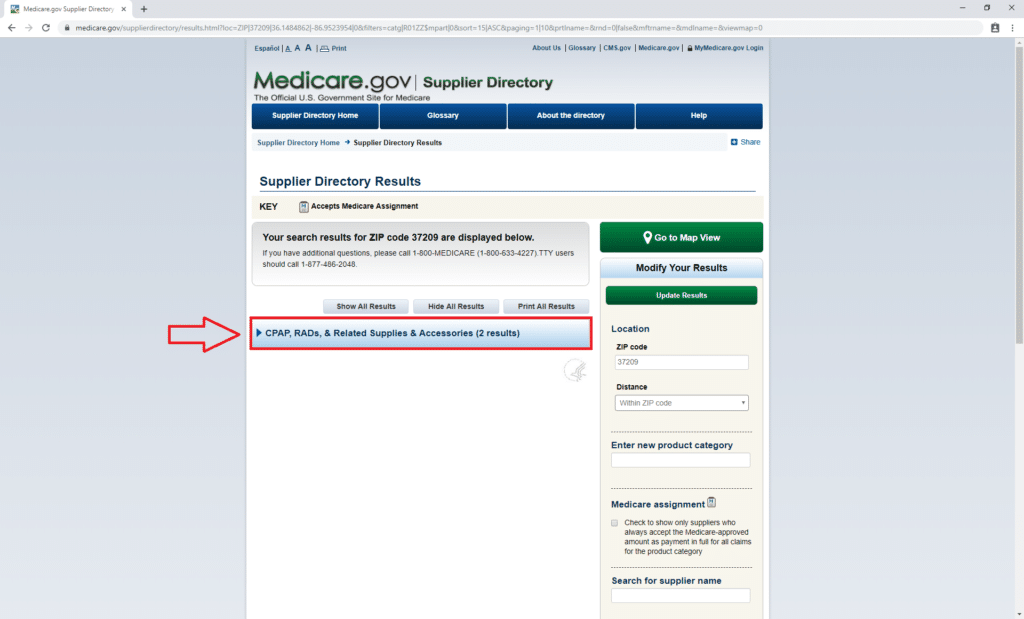
The next page will display contact information for the DME providers. Call them to discuss their services and costs. You may need to call more than one to find a good fit.
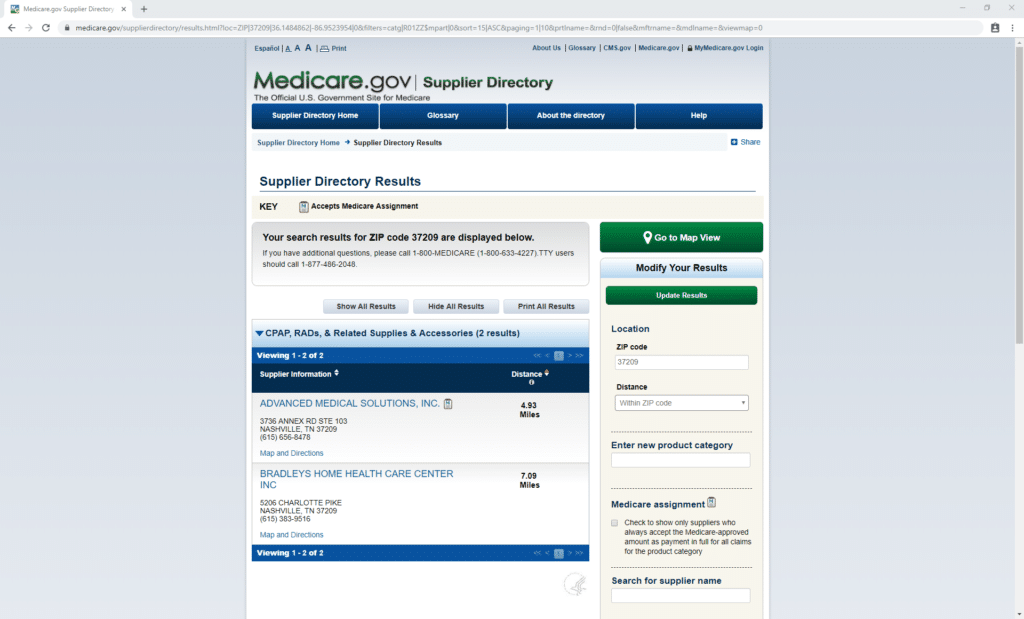
Does Medicare Cover Sleep Apnea Equipment?
Some people may not be able to use a CPAP machine. Medicare will cover an oral appliance in that case, if your doctor prescibes one. An oral appliance holds the jaw open and allows the user to breathe by keeping the airway clear.
Does Medicare Cover Sleep Apnea Testing?
Medicare Part B will cover sleep apnea testing if your doctor orders a test for you. Medicare will typically pay for 80 percent of the associated costs after you’ve met the Part B deductible.
Sleep tests are usually performed at a sleep center or at a hospital, and the tests record your nighttime sleep patterns. The tests provide your doctor with a detailed snapshot of how you sleep, and he or she can use the results to render a diagnosis.
Medicare will cover in-home test types I-IV if you display sleep apnea symptoms. The in-home tests can only screen for sleep apnea and not for other sleep disorders.
What Else Does Medicare Cover for Sleep Apnea?
Medicare Part B is public health insurance. Its coverage is limited to what the federal government approves.
Sleep apnea affects every area of a person’s life, and patients should be treated with their overall health in mind.
Private insurance carriers offer policies called Medicare Part C (Medicare Advantage) plans that can provide coverage beyond Original Medicare. Some plans offer transportation to doctor’s appointments, meal delivery, fitness classes, and prescription drugs.
Doctors typically do not prescribe medications as a primary sleep apnea treatment, but sometimes doctors recommend drugs to help manage sleep apnea symptoms. Medicare Part D or certain Medicare Advantage plans will cover prescription drugs such as Ambien to help you sleep or Provigil to help you stay awake.

Sleep Apnea Causes
The most common form of sleep apnea is obstructive sleep apnea. It occurs when the throat muscles relax and block the airway. Throat muscles support the tongue, the side walls of the throat, and the tonsils.
With sleep apnea, the muscles relax and your airway collapses, you can’t get enough air into your lungs, and your oxygen levels decline. To compensate for this decline, your brain will wake you up so that you can breathe freely.
The time awake is often so brief that you don’t remember it, but the frequent sleep interruptions make it impossible for you to enter into a deep sleep. Your body needs that deep sleep to produce hormones and repair muscle and bone tissue.
Central sleep apnea is less common, and it occurs when your brain doesn’t signal your breathing muscles to activate. This means your brain won’t make an effort to breathe for a brief period, and you’ll wake up with shortness of breath and likely have a tough time falling asleep again.
Risk Factors for Obstructive Sleep Apnea

Obstructive sleep apnea risk factors include:
- Obesity: Excess weight dramatically increases the risk of sleep apnea. Fat deposits surrounding your upper throat can block your breathing.
- Neck circumference: Thicker necks can mean narrower airways for some people.
- Sex: Adult males are twice as likely to develop sleep apnea than women.
- Age: Older adults have a much higher rate of sleep apnea than younger adults.
- Family history: If you have immediate family members with sleep apnea, that can mean a greater risk of you developing the sleep disorder.
- Smoking: People who smoke are at a significantly higher risk of sleep apnea because tobacco use can increase throat inflammation and fluid retention.
- Nasal congestion: If breathing through your nose is difficult because of allergies or an anatomical problem, you’re at a higher risk of developing obstructive sleep apnea.
Risk Factors for Central Sleep Apnea
Central sleep apnea risk factors include:
- Age: Like with obstructive sleep apnea, older adults have a higher risk of developing central sleep apnea.
- Sex: Males more commonly develop central sleep apnea than females, just like with obstructive sleep apnea.
- Heart conditions and stroke: Having congestive heart failure means you’re more likely to develop central sleep apnea.
Why Sleep Apnea is Dangerous
Sleep apnea is a serious condition that can be associated with a host of other conditions. Chronic sleep problems can lead to extreme daytime fatigue, which means you’re more likely to fall asleep while driving.
Sleep apnea makes heart attacks and strokes more likely because it can cause an irregular heartbeat. You can develop insulin resistance with sleep apnea, which means type 2 diabetes is a strong possibility. Your liver can develop scar tissue that signifies nonalcoholic fatty liver disease.
You may have sleep apnea if you have symptoms such as loud snoring, if you wake up with dry mouth every morning, or if your partner tells you that you stop breathing while you sleep. If you experience those symptoms, you should talk to your doctor.
We Can Help You Find Medicare Sleep Apnea Coverage
Original Medicare will help cover the cost of your CPAP machine, but you may need a Medicare Advantage plan to cover other parts of your sleep apnea treatment. There are many Medicare Advantage plans to choose from, and a licensed agent can help you choose the right one for you. Call us at 844-431-1832 or contact us here today.


